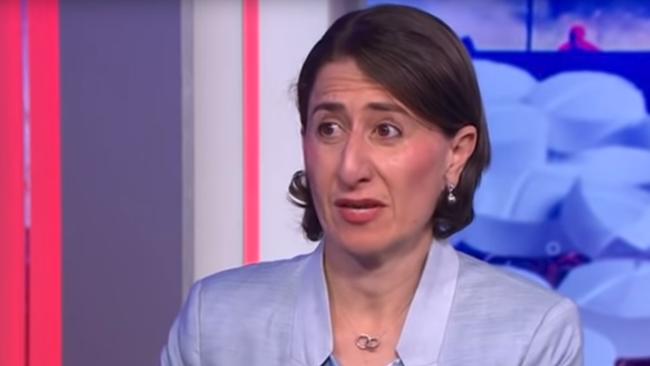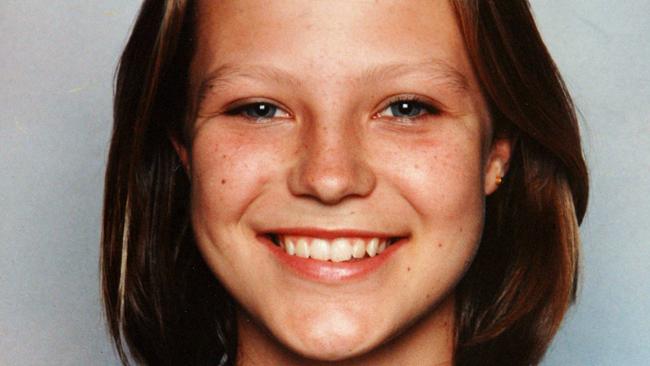Pill-test debate shows Gladys’s true strength
When it comes to drug safety, the best option is the most obvious. But strangely, it seems Gladys Berejiklian is one of the few modern leaders brave enough to say so, writes Miranda Devine.
In her own quiet way, Premier Gladys Berejiklian showed this week that she has more steel in her spine than the current crop of fence-sitting politicians.
Under intense badgering from the Sunrise program’s holier-than-thou host David “Kochie” Koch she held the unfashionable line on pill testing, in the wake of the fifth drug death of a young person at a dance festival this summer.
Despite being badged “dogmatic” and a “hypocrite” by the preachy TV personality, Berejiklian calmly replied: “Kochie, we need to deal with the evidence, and the evidence is that unfortunately these kids are dying from the ecstasy, from the MDMA in the tablets, the actual ecstasy …
“We want people to have fun, but we don’t want them to die and the best message we can send to them is these substances, the MDMA, the ecstasy, can kill you. Don’t take these drugs.”
Hallelujah. That is the point.
Sensing he was being beaten on the argument, Kochie tried to make the Premier look like either a hypocrite or a prude by asking: “Did you try drugs when you were younger?”
“I actually didn’t,” she replied.

“You didn’t?” he asked incredulously, as if Berejiklian is some sort of outlier, rather than representative of the majority of Australians.
“Marijuana?” he probed.
“I didn’t try anything,” she replied firmly.
“My point is this that if pill testing was going to prevent deaths of course we would bring it in, but we know from the evidence presented to us the best thing we can do is improve medical attention at these festivals.”
And that is the most responsible thing she could do as Premier.
Unlike Kochie, she has a duty of care to the citizens of NSW.
Ensuring that anyone suffering the relatively rare lethal side effects of ecstasy at dance festivals receives immediate medical treatment will actually save lives. Everyone can agree with that.
The death of 19-year-old Alexandra Ross-King at Saturday’s FOMO festival is such a tragedy it is understandable that well-meaning people, including members of her grieving family, want it to mean something. They want her death to be the last drug death at a music festival. We all do.
But it’s a cruel trick to pretend that there is some magic technological solution to the pill-poppers’ game of Russian roulette.

The safest outcome obviously is not to use illicit drugs. You enforce this through police and security, a regime which led to significantly less drug use among young people during John Howard’s “Tough on Drugs” era.
Pill testing undermines that regime; it’s contradictory to have a tough police presence at the same venue as a safe haven for illicit, harmful substances.
The counterargument from pill testing advocates is that if it saves even one life, then it’s worth it. But there’s no evidence for that assertion and logic dictates that there could be a reverse effect, since pill-testing creates a false sense of security. Regardless of any warnings issued by testers as they hand back the drugs, the impression is of a government-backed safety guarantee.
Berejiklian and her advisers know that the real danger is from ecstasy, itself, which has erroneously developed a reputation as a “safe” drug. That’s despite the real-life evidence of its harms, dating back in Australia to the 1995 death of 15-year-old Anna Wood, a first time ecstasy user who effectively drowned because the drug interferes with the body’s ability to process water, just one of its dire potential side effects.
NSW Poisons Information Centre toxicologist Professor Andrew Dawson also told The Daily Telegraph that ecstasy interferes with the body’s ability to regulate its own temperature. Combined with dancing in Sydney’s summer heat, your internal temperature can rise above 41C, which cooks your organs like “cooking an egg”.
Pill testing’s aim is to give users the green light to take ecstasy. How does that reduce harm?
And pretending that testing will make ecstasy safe removes the last remaining deterrent: fear.

In any case, the manufactured urgency over pill testing is driven by the myth that there is an unstoppable tsunami of illicit drug use among young people.
The truth is that Millennials are more abstemious than their ageing hippy and slacker elders, according to the 2016 Australian National Drug Strategy Household Survey.
Illicit drug use by 14—19 year olds plummeted between 2001 and 2016; use of cannabis halved, use of ecstasy and cocaine declined by one-third, and use of meth/amphetamines dropped from 6.2 to 0.8 per cent.
Among people in their 20s — who always have been the highest risk group — “over the longer term, daily smoking, risky drinking, and recent use of cannabis and ecstasy were all significantly and considerably lower than for previous generations (when in their 20s).”
We never hear this good news because everyone’s so eager to bash Millennials for such insolence as eating smashed avocado on toast.
Unlike the Premier, NSW Labor leader Michael Daley showed he will do anything for the youth vote this week: “Just saying no to young people has been proven over many, many generations not to work,” he declared, advocating yet another talkfest as a solution. Daley hasn’t seen a problem he can’t push off on to some sort of committee or summit.
But he just makes Berejiklian look like more of a leader.
Good for her. Standing on conviction wins elections.


